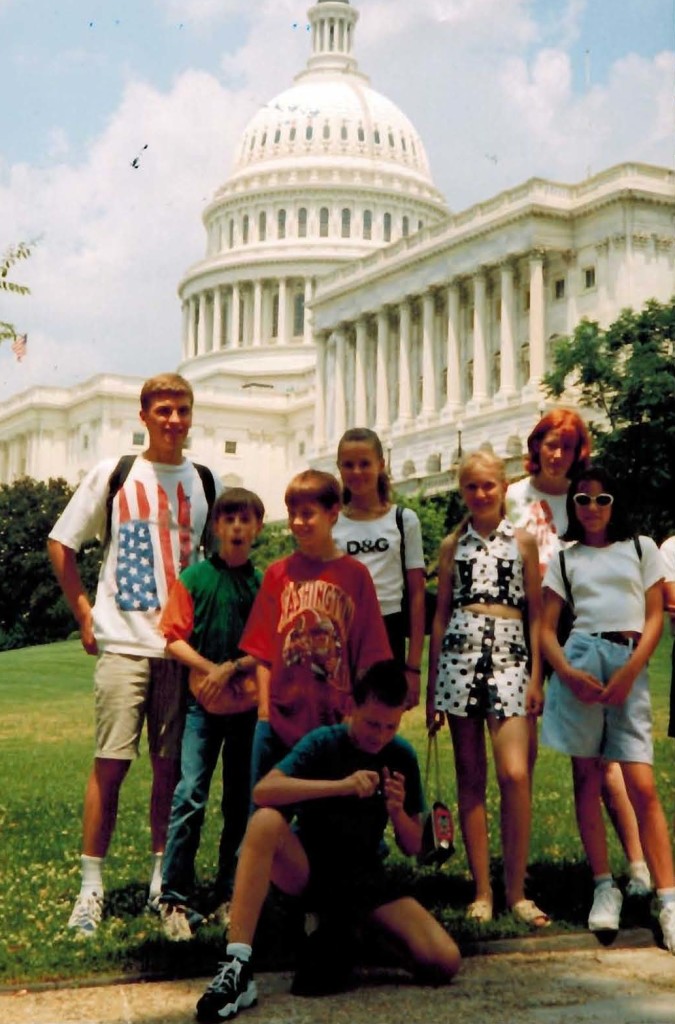Cherrydale’s Russia Initiative

The year was 1997. In a remote town in the Ural Mountains, two girlfriends in the same apartment building shared dreams. Anna Kazmin (Anya), 12, studied ballet; Daria Tregoubova (Dasha), 13, played piano. They dreamed of a wider world. Somehow, their parents, all four of whom worked for the Ural Mountain Petroleum Plant, scraped together enough rubles to send them to America. One friend lent a camera; others contributed travel clothes and gifts for their American hosts. Elsewhere in Siberia additional children had similar dreams. Days before they were to depart, however, some heard that not enough host families had been located in Virginia. But seven children, including Anya and Dasha, were lucky and began their long journey to Arlington.
In a comfortable suburb of our nation’s capital, Cherrydale United Methodist Church had been looking for ways to focus on missions and extend outreach. One member noticed an ad in the Virginia Conference newsletter seeking host families for Russian children visiting the US in the summer of ’97. The purpose of the “Russia Initiative” was to provide three weeks in a healthy, Christian environment for children whose immune systems were challenged by widespread industrial pollution. Cherrydale families eagerly signed up and wondered how sick the children would be. Soon they heard that Anya, Dasha, Iulia, Nastya, Anton, Vanya, and Roma were on their way.
Vacation Bible School was in session when they arrived and proved to be a good introduction to American life. The Russians even contributed a folk dance to the final program. Then church members hosted a round of cook-outs, swim parties, and Fourth of July fireworks. A women’s circle financed a trip to King’s Dominion. The men underwrote horseback riding in the Virginia countryside. Betsy and Sherfy Jones invited the kids and their hosts to spend the night at their beach house in Rehoboth, DE.
Our family was fortunate to have the interpreter, Misha Kouznetsov, stay with us. We also entertained Anya and Dasha for a week, while the girl who was to be their host sister recovered from chicken pox. Misha, a very mature 17-year old, was the son of the Russian co-founder of the program and had already been to America four times. He spoke English very well, and led the children effectively. Russian speakers in our church stepped up. Natasya Gilmore, Harry and Carol’s daughter-in-law, who was from Vladivostok, translated the visitors’ itinerary and explained to them why suntan lotion, unknown in Russia, was important to use (some still got sunburned). Others prepared a welcome sign for their arrival at Dulles airport and greeted them in Russian. A collection during Bible School covered the cost of a Russian Bible for each visitor. They responded with a hand-carved wooden model of an Orthodox church that Cherrydale still proudly displays.
The host families–the Corbets, Strehles, McQueens, LaPlantes, and Ellsworths–were key to the success of this venture. They cooked food that pleased and became adept at distinguishing fatigue from homesickness. Memorable moments: the girls jumping off a high diving board after first crossing themselves; the boys’ delight in water balloons and super-shooters; the trepidation all felt as they crossed the Chesapeake Bay Bridge, their hands clenched together; the fear, wonder, and ultimate joy with which they encountered an ocean beach for the first time. The girls quickly mastered American-style slumber-partying, while the boys stayed up late playing–what else?–Monopoly.
Aeroflot delayed their departure three days from the original schedule. I was due at my 35th high school reunion in Texas. When I apologized to Misha that I couldn’t see them off, he said he understood, “You must return to the Mother Country!”
At the farewell party, language barriers fell and everyone had a great time. The grown-ups remarked on the great quantity of fruit the Russians could consume, but marveled at the similarity of Russian and American children’s interests. “Why have we had missiles pointed at each other all these years?” one asked.
It is now eighteen years and many Bible Schools later. This summer I am sorting through many file drawers of memories, where I found my notes from Summer 1997 and several unanswered letters from Russia. How I wish I could say that our church kept up with these visitors, but in 1997, before widespread email, we had trouble even deciphering their postal addresses, much less responding in Russian. I can find the little village of Verkhnie Sergi in the province of Sverdlovsk on Google Maps, but Google Maps can determine no route from here to there. Did their three weeks here really provide health benefits? Were they inspired to keep seeking wider opportunities? Is their faith still strong? I hope that Anya, Dasha, Misha and all the other Russians remember their time with us as fondly as many in our church do. Surely, person-to-person experiences are the best path to peace.
Leave a Reply